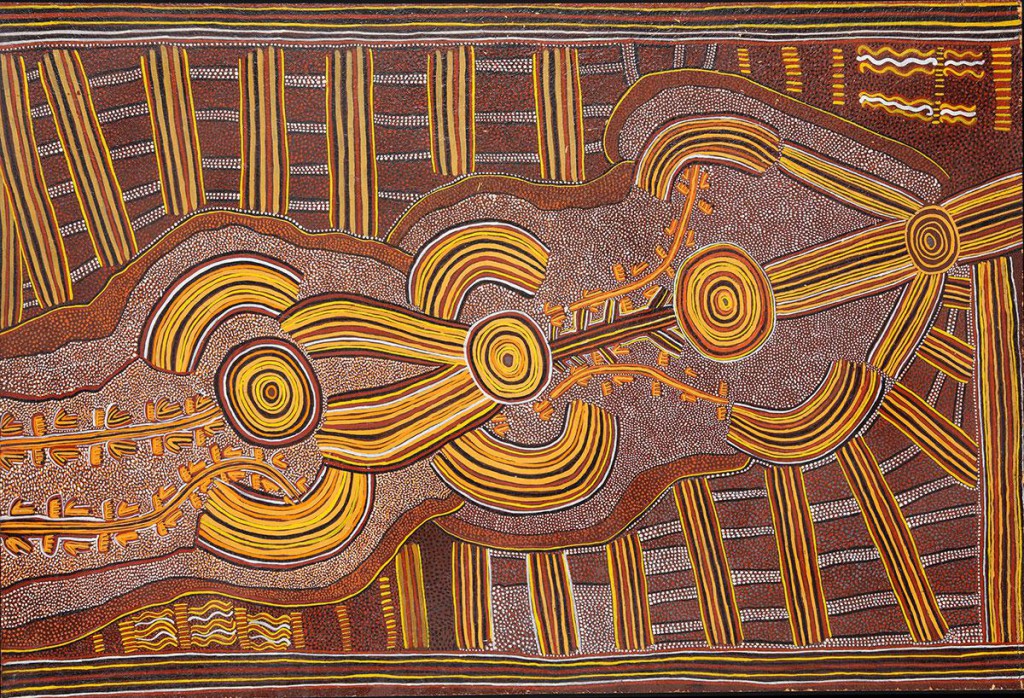
Mick Namarari Tjapaltjarri, Kangaroo Man Ancestor and Bush Tucker Dreaming at Walukaritji, c. 1973, acrylic on board, 87 x 58 cm. ©2016 Aboriginal Artists Agency Ltd, Australia.
The Andrew W. Mellon Foundation has awarded US $815,000 to the University of Virginia to create a research centre for the study of the indigenous art of Australia and the Americas. The University is contributing approximately $886,000 to the Indigenous Arts initiative over the course of the Mellon grant, making the initial investment to launch the research and teaching program about $1.7 million. The funding is for four years and will be shared across the College and Graduate School of Arts & Sciences, The Fralin Museum of Art at UVA and the Kluge-Ruhe Aboriginal Art Collection. It will support the creation of two curator positions for the University’s extensive collections of indigenous art and support a new residency program for visiting scholars, artists and curators. The Mellon-funded program also will support fellowships for UVA faculty pursuing creative and scholarly projects in the arts, as well as a program providing graduate school opportunities to undergraduate students from diverse communities and a broad range of academic disciplines who are interested in the curatorial field.
From UVA
‘As we consider the critical role to be played by the arts in the world’s leading public research institutions, this proposal seeks to take advantage of the unique shared strengths of Arts & Sciences, and the University’s renowned collections at The Fralin Museum of Art and the Kluge-Ruhe Aboriginal Art Collection,’ Arts & Sciences Dean Ian Baucom said.
The Fralin Museum of Art has an extensive collection of Western art and serves as a treasure trove of underutilized materials from cultures stretching from Alaska to the Andes. In addition to a growing collection of more than 700 works by artists of the African diaspora, 680 works of Native American art and more than 2000 examples of Pre-Columbian art, The Fralin features more than 1100 works of Asian art.
Attracting eminent artists and scholars from around the world, the Kluge-Ruhe Aboriginal Art Collection is widely considered the finest collection of indigenous Australian art outside Australia. It possesses more than 1800 objects, including paintings on bark and canvas, limited-edition prints, sculptures, woven works and ceremonial artifacts.
Francesca Fiorani, associate dean for the arts and humanities and a professor of art history, said the Mellon-supported Indigenous Arts initiative will open new research directions for faculty as well as creative learning experiences for UVA students. New areas of research could raise questions about different models of representation or challenge accepted colonial and post-colonial narratives, Fiorani said, and UVA’s collections would provide a way to engage contemporary Indigenous Australian and Native American artists at the vanguard of global art practices.
“This new center aligns with the core mission of the University of Virginia and the College and Graduate School of Arts & Sciences, which aim to expand students’ opportunities for experiential learning via inventive – and inspired – forms of pedagogy,” said Fiorani, who oversaw the development of the Mellon grant application.
The Indigenous Arts grant will complement the $3.47 million in Mellon funding that UVA received in 2015 to launch a major humanities initiative dedicated to the study of the Global South. In December, the College and Graduate School of Arts & Sciences awarded its first round of Mellon Humanities Fellowships in the Institute for Humanities & Global Cultures for UVA faculty, supported by funding from the Global South grant.
